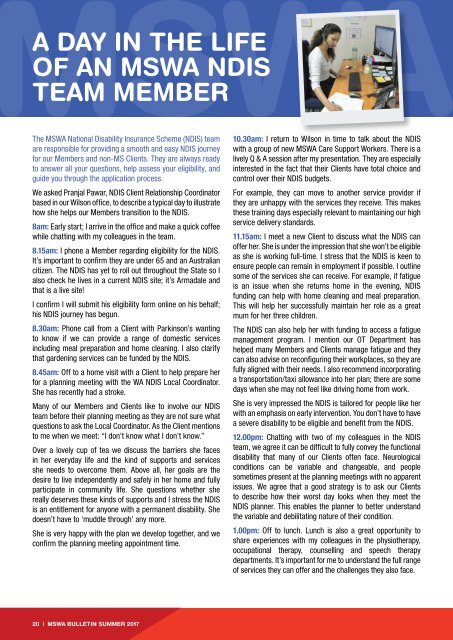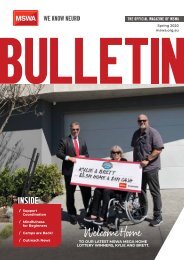MSWA Bulletin Magazine Summer 17
You also want an ePaper? Increase the reach of your titles
YUMPU automatically turns print PDFs into web optimized ePapers that Google loves.
A DAY IN THE LIFE<br />
OF AN <strong>MSWA</strong> NDIS<br />
TEAM MEMBER<br />
The <strong>MSWA</strong> National Disability Insurance Scheme (NDIS) team<br />
are responsible for providing a smooth and easy NDIS journey<br />
for our Members and non-MS Clients. They are always ready<br />
to answer all your questions, help assess your eligibility, and<br />
guide you through the application process.<br />
We asked Pranjal Pawar, NDIS Client Relationship Coordinator<br />
based in our Wilson office, to describe a typical day to illustrate<br />
how she helps our Members transition to the NDIS.<br />
8am: Early start; I arrive in the office and make a quick coffee<br />
while chatting with my colleagues in the team.<br />
8.15am: I phone a Member regarding eligibility for the NDIS.<br />
It’s important to confirm they are under 65 and an Australian<br />
citizen. The NDIS has yet to roll out throughout the State so I<br />
also check he lives in a current NDIS site; it’s Armadale and<br />
that is a live site!<br />
I confirm I will submit his eligibility form online on his behalf;<br />
his NDIS journey has begun.<br />
8.30am: Phone call from a Client with Parkinson’s wanting<br />
to know if we can provide a range of domestic services<br />
including meal preparation and home cleaning. I also clarify<br />
that gardening services can be funded by the NDIS.<br />
8.45am: Off to a home visit with a Client to help prepare her<br />
for a planning meeting with the WA NDIS Local Coordinator.<br />
She has recently had a stroke.<br />
Many of our Members and Clients like to involve our NDIS<br />
team before their planning meeting as they are not sure what<br />
questions to ask the Local Coordinator. As the Client mentions<br />
to me when we meet: “I don’t know what I don’t know.”<br />
Over a lovely cup of tea we discuss the barriers she faces<br />
in her everyday life and the kind of supports and services<br />
she needs to overcome them. Above all, her goals are the<br />
desire to live independently and safely in her home and fully<br />
participate in community life. She questions whether she<br />
really deserves these kinds of supports and I stress the NDIS<br />
is an entitlement for anyone with a permanent disability. She<br />
doesn’t have to ‘muddle through’ any more.<br />
She is very happy with the plan we develop together, and we<br />
confirm the planning meeting appointment time.<br />
10.30am: I return to Wilson in time to talk about the NDIS<br />
with a group of new <strong>MSWA</strong> Care Support Workers. There is a<br />
lively Q & A session after my presentation. They are especially<br />
interested in the fact that their Clients have total choice and<br />
control over their NDIS budgets.<br />
For example, they can move to another service provider if<br />
they are unhappy with the services they receive. This makes<br />
these training days especially relevant to maintaining our high<br />
service delivery standards.<br />
11.15am: I meet a new Client to discuss what the NDIS can<br />
offer her. She is under the impression that she won’t be eligible<br />
as she is working full-time. I stress that the NDIS is keen to<br />
ensure people can remain in employment if possible. I outline<br />
some of the services she can receive. For example, if fatigue<br />
is an issue when she returns home in the evening, NDIS<br />
funding can help with home cleaning and meal preparation.<br />
This will help her successfully maintain her role as a great<br />
mum for her three children.<br />
The NDIS can also help her with funding to access a fatigue<br />
management program. I mention our OT Department has<br />
helped many Members and Clients manage fatigue and they<br />
can also advise on reconfiguring their workplaces, so they are<br />
fully aligned with their needs. I also recommend incorporating<br />
a transportation/taxi allowance into her plan; there are some<br />
days when she may not feel like driving home from work.<br />
She is very impressed the NDIS is tailored for people like her<br />
with an emphasis on early intervention. You don’t have to have<br />
a severe disability to be eligible and benefit from the NDIS.<br />
12.00pm: Chatting with two of my colleagues in the NDIS<br />
team, we agree it can be difficult to fully convey the functional<br />
disability that many of our Clients often face. Neurological<br />
conditions can be variable and changeable, and people<br />
sometimes present at the planning meetings with no apparent<br />
issues. We agree that a good strategy is to ask our Clients<br />
to describe how their worst day looks when they meet the<br />
NDIS planner. This enables the planner to better understand<br />
the variable and debilitating nature of their condition.<br />
1.00pm: Off to lunch. Lunch is also a great opportunity to<br />
share experiences with my colleagues in the physiotherapy,<br />
occupational therapy, counselling and speech therapy<br />
departments. It’s important for me to understand the full range<br />
of services they can offer and the challenges they also face.<br />
20 | <strong>MSWA</strong> BULLETIN SUMMER 20<strong>17</strong>


















